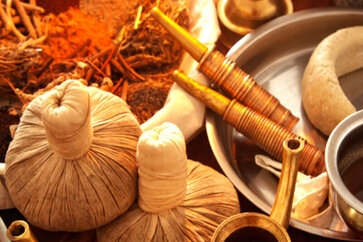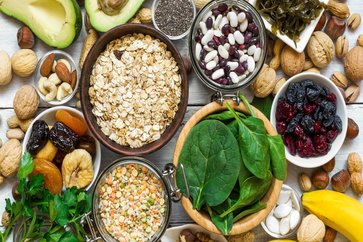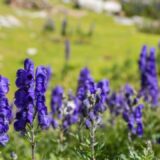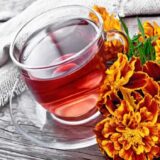How Eat Healthy In Winter As Per Ayurveda?
At last Shishira (winter) season is here, it comes from Mid- January to Mid- March. With each change of season, nature experiences a series of changes and these changes affect us directly.  After all, we are also part of that nature and that is why it is essential to adapt to the changes in our lifestyle in order to find natural balance, to protect our integral well-being.
After all, we are also part of that nature and that is why it is essential to adapt to the changes in our lifestyle in order to find natural balance, to protect our integral well-being.
The summer is the time of the Pitta dosha, which is directly associated with the elements of fire and water. Autumn is the time of Vata and Vata is associated with the elements of air and ether, which gives prominence during the first part of winter, gradually giving way to Kapa, which will be imposed on all other doshas.
Adopting an Ayurvedic lifestyle during the winter has a number of benefits for our bodies. Among these benefits we can highlight the following:
- It calms the nervous system avoiding nervousness and Natural Ayurvedic Home Remedies For Anxiety.
- Promote concentration.
- It nourishes the body and improves its energy levels by providing deep nutrition to our tissues.
- It favors deep sleep.
- Avoid constipation favoring the expulsion of waste.
- Protect our immune system.
All these benefits derived from following an Ayurvedic lifestyle during the winter which is summarized above is the final goal to sustain and optimal promotion of our health.
But … what are we talking about when we talk about an Ayurvedic lifestyle in winter? Fundamentally, to follow a series of routines among which the diet especially stands out.
What should we eat in cold in Ayurveda?
What Ayurvedic food should be in winter? The first thing to keep in mind is that, as winter is a cold season, we should avoid eating cold foods because, in doing so, we would risk unbalancing our doshas (and that is precisely what Ayurveda intends to avoid above everything).
1.Eat Wormfood: To balance the doshas, it would be necessary to eat warm or hot foods such as soup, broths, and stews. It can be made up of beets, carrots, green leafy vegetables, it can also be from other root-based vegetables and are extremely beneficial.
2. Eat spicy and hot food: Among the flavors that Ayurveda recommends boosting in winter are spicy, bitter, and astringent. How can we enhance these flavors to have a good Ayurvedic diet in winter? Using spices such as turmeric, pepper, ginger, cayenne, or cinnamon, or foods such as broccoli, eggplant, lentils, spinach, or garlic.
3. Eat bitter or astringent foods: In the same way that it is necessary to consume spicy, bitter, or astringent foods, it is necessary to avoid the typically Kapha flavors, that is, those flavors that would increase this dosha in excess and, therefore, would cause an excess of it.
4. Eat protein food: The Ayurvedic food for the winter should be based on a diet of protein like vegetables, cereals, and legumes, and broth – cooked, and also in seasonal food intake.
5. Eat seasonal winter food: Among the typical seasonal winter foods, we can highlight pumpkin, berries, blueberries, and citrus fruits. Another product that can not be missing in winter Ayurvedic food is fatty fish such as salmon, sardines, mackerel, anchovies, or swordfish.
What flavors are those? The sweets, the salty and sodas, and other sweetened beverages. Abusing the consumption of bananas, cucumbers, or dairy products would cause an increase in mucus and sleep, as well as the tendency to accumulate fat.
Ayurvedic diet and routines for winter
Beyond the maintenance of a specific Ayurvedic diet for the winter months, Ayurveda recommends a series of routines to follow in winter and among which we highlight the following:
- Get up early, preferably at dawn.
- Brush your teeth and clean your tongue with herbal pastes. After that, you can oil pulling with sesame oil for 2 or 3 minutes. This Ayurvedic therapy serves to reduce bruxism, headaches, and cervicalgia. After that, you have to massage the gums with that oil.
- Drink a glass of hot water with lemon juice to clean the digestive system and wake up the Agni.
- Drink green tea or chai tea that contains cinnamon, cardamom, cloves, ginger, and pepper.
- Perform a self-massage with sesame oil. Self-massage with sesame oil helps to move the accumulated toxins in the tissues. On the other hand, being sesame oil is a hot oil, it will serve to warm the body, which is very useful in winter. If desired, you can add a few drops of essential oils of cinnamon, geranium, jasmine, lavender, or orange to the sesame oil. After applying the self-massage, let the skin absorb the oil for about twenty minutes. That will be the way to get the maximum benefits from this Ayurvedic winter routine.
- Enjoy an aromatic bath every so often. The bath can serve, perfectly, to remove the remains of oil after a self-massage. The aromatic bath will also have invigorating, energizing, and anti-depressant effects. For this, essential oil of eucalyptus, rosemary, pine, juniper, ginger, grapefruit, or bergamot (among others) must be added to the bathwater, which will have Epsom salt or sea salt baths.
- Perform a gentle yoga practice in which asanas destined to work the area of the hips and those that serve to open the chest, throat, and sinuses for nasal passages acquire special relevance.
- Eat at least three times a day and leaving three hours between each meal. Among these three meals, the most consistent should be that of noon. Breakfast and dinner should be light. This should be done, if possible, before sunset.
- Do not eat between meals and, if done, eat cooked fruit, dates, or a few nuts.
- Establish strict schedules for going to sleep and waking up.
The cold of winter causes the mucous membranes of the nose to suffer more than during other seasons, so Ayurveda recommends applying two drops of sesame oil in the nostrils, which helps keep them moist and balanced.



























My daughter introduced me to Indian eating, and I’ve found through practice
and application of it seasonally; that I am relieved mentally and physically. Depression, caused by an inept feeling that something’s wrong, begs honing in on. My belief is that Indian diet science is tuned to nature, and gives relief. That which we can sense, needs real change for what our body goes through, yearly. Affects, in homeostasis, or our circadian cycle; the least understood of all: the effect on the rise and fall of our sap/ hibernation or dormancy period, in winter. We are referred to as the highest food on the food chain; unable to factually escape that we are governed by earth, and her moon; which nourish and cycle our years, no matter our age or gender.
Open your windows for about 10-15 minutes every morning. This will allow to mix the air a bit, so the dry air leaves your room